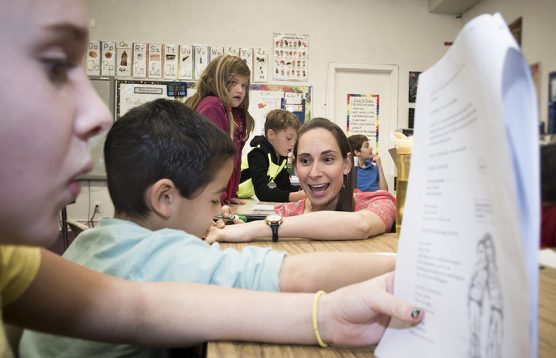California State University, Northridge has received a $1.1 million, five-year grant from the U.S. Department of Education to provide financial support to early childhood special education teacher candidates.
Zhen Chai, an associate professor of early childhood special education, said the grant also supports the creation of “a pipeline” to getting a teaching credential for undergraduate students majoring in child and adolescent development.
This grant helps remove a major obstacle, finances, that often stands in the way of so many of our students completing their credential, particularly at a time when the demand for qualified, credentialed teachers is rising,” Chai said. “The need is especially great for credentialled teachers who can serve children with special needs from underserved communities. This grant will help us meet that need.”
Specifically, she said, the grant supports Project CREATE: Preparing Culturally Responsive Early Educators in Teacher Education, housed in the Department of Special Education in CSUN’s Michael D. Eisner College of Education.
Chai said the grant would provide up to $20,000 in financial support to 30 students over the next five years who are getting their preliminary education specialist credential. Educators with such a credential can conduct assessments, provide instruction and special education-related services to children from birth through kindergarten. Applications for the project will be available in spring 2023, with the first cohort of students starting in fall 2023.
“Study after study has demonstrated that kids learn better when they are being taught by teachers who come from similar backgrounds,” Chai said. “There is a huge need for teachers who come from a diversity of backgrounds. We are trying to increase the number of teacher candidates from traditionally underrepresented groups.”
Chai said the program will provide students with ongoing support, including experienced mentor teachers from participating community partners, including schools in the Los Angeles Unifies School District, who will meet regularly with the teacher candidates.
Chai said she is particularly excited that the grant supports the development of a pipeline between the university’s Department Child and Adolescent Development in the College of Health and Human Development and Project CREATE.
In the past, she said, students majoring in child and adolescent development and interested in getting a preliminary education specialist credential had to complete their bachelor’s degrees before applying to the credential program.
Project CREATE, Chai said, will work with those students while in their senior year and help them prepare for the standardized tests they are required to pass before they can apply to the credential program.
“Project CREATE also will provide them with funding toward getting their credential,” she said. “This way, they are already on the path to the credential while they are still seniors.”
Chai called the grant timely, noting that the current early childhood special education credential allows holders to provide services to young children from birth to 5 years of age in early intervention and in preschool/prekindergarten programs.
In August 2018, the California Commission on Teacher Credentialing approved the new program standards and Teaching Performance Expectations (TPEs) for the Preliminary Special Education Teaching Credential, which authorizes holders to also serve students who are in transitional kindergarten and kindergarten. For the first time, newly credentialed ECSE teacher candidates will be eligible to co-teach in these settings as well.
“School districts across the state are scrambling to find teachers to meet these new requirements,” she said. “We are providing a whole new cohort of teachers who can serve these communities and who also have the skills to make them effective special education teachers.”
While the Department of Education grant is for five years, Chai said it is providing key foundational support for a program that she and her colleagues hope will continue well beyond that time.
Like this:
Like Loading...
Related





 Tweet This
Tweet This Facebook
Facebook Digg This
Digg This Bookmark
Bookmark Stumble
Stumble RSS
RSS
































REAL NAMES ONLY: All posters must use their real individual or business name. This applies equally to Twitter account holders who use a nickname.
0 Comments
You can be the first one to leave a comment.